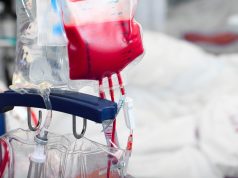Treatment linked to reduction in all-cause mortality, recurrent acute MI though 12-month follow-up
THURSDAY, Jan. 28, 2016 (HealthDay News) — For patients hospitalized with acute myocardial infarction (AMI), the use of n-3 polyunsaturated fatty acids (PUFAs) is associated with reduced risk of all-cause mortality and recurrent AMI through 12-month follow-up, according to a study published in the Feb. 1 issue of The American Journal of Cardiology.
Stephen J. Greene, M.D., from the Duke University Medical Center in Durham, N.C., and colleagues conducted a retrospective observational cohort study involving patients who were discharged from the hospital with a primary diagnosis of AMI. Patients were linked across governmental hospital discharge, medication prescription, and mortality databases, and followed for 12 months after index discharge. The authors compared patient characteristics and risk of all-cause mortality and repeat AMI by n-3 PUFA prescription after discharge at a presumed dose of 1 g/day. Data were included for 11,269 patients, of whom 21.5 percent were prescribed n-3 PUFA during follow-up.
The researchers found that patients treated with n-3 PUFAs tended to be younger, men, and have a diagnosis of diabetes; they were also more likely to be receiving guideline-recommended post-AMI therapy (β-blockers, angiotensin-converting enzyme inhibitors/angiotensin II receptor blockers, statins, and antiplatelet therapy; all P < 0.001). Through 12-month follow-up, n-3 PUFA therapy correlated with reduced all-cause mortality and recurrent AMI (hazard ratios, 0.76 and 0.65, respectively) after adjustment for patient characteristics and concurrent therapies.
“These data support further randomized controlled trials with n-3 PUFA therapy in the post-AMI setting,” the authors write.
Two authors disclosed financial ties to pharmaceutical companies, including Sigma Tau Pharmaceuticals, which funded the study.
Copyright © 2016 HealthDay. All rights reserved.








